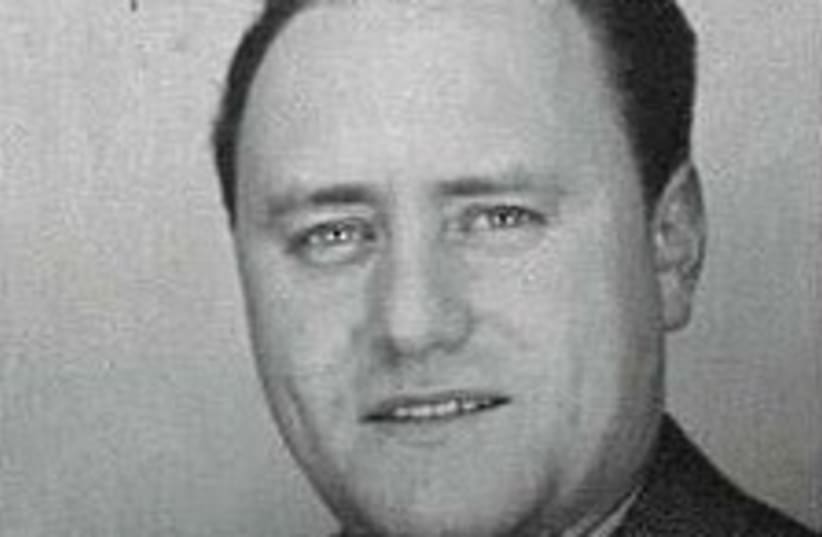Why won't Yad Vashem honor Jewish rescuers?
They doubled their own risks trying to secure havens for their fellow Jews.
Many years ago, in my work as head of the Righteous Among the Nations Department at Yad Vashem, I was told by Dr. Josef Michman of a Jewish man named Walter Suskind, who utilizing devious ways was able to rescue hundreds of of Jews while constantly under the watchful eyes of the SS commander of the Hollandse Schouwburg, the Dutch theater in Amsterdam that was converted into a transit camp for tens of thousand of Jews on their way to concentration camps. Suskind was eventually deported himself, and did not survive.
At about the same time, Dr. Lucien Lazare apprised me of a major French Jewish rescuer of Jews, Moussa Abadi, who together with his future wife Odette Rosenstock created a private rescue network in the Nice region and were responsible for the rescue of 527 Jewish children. Odette Rosenstock was arrested and tortured by Alois Brunner to disclose the whereabouts of Moussi Abadi in Nice. She was sent to Auschwitz, which she luckily survived.
Michman and Lazare, both distinguished members of the Commission for the Designation of the Righteous at Yad Vashem that honors non-Jewish rescuers of Jews, respectively specialize in rescue operation in the Netherlands and France.
These two stories are not isolated cases, for there were others - such as Max Leons in the Netherlands, Yvonne Jospa in Belgium, Andrée Salomon, Georges Garel and Joseph Bass in France, Vladka Meed in Poland and more - who were all active in finding safe sheltering places for Jews on the run, mostly among non-Jewish helpers. The non-Jewish rescuers were honored by Yad Vashem as Righteous Among the Nations.
The stories of the Jewish rescuers, who braved additional risks by traveling under assumed names on trains and searching the countryside for safe havens for their compatriots, are neglected. No program was devised to acknowledge their deeds, let alone honor them.
MANY CLAIM that Jews who rescued Jews were simply doing their duty. This argument, surprisingly, is not applied to Jews who took up arms to fight the Nazis. They are lauded and applauded. Jewish rescuers of Jews who, like the Zionist underground in Hungary, decided that the more important order of the day was to save fellow Jews, with all the additional risks that this implied for themselves, are overlooked and largely forgotten.
The result, strange as it may sound, is that Israel, through Yad Vashem, refuses to honor the Jewish people's own rescuers. Had this been a case of Frenchmen rescuing fellow Frenchmen from the Nazis, the French government would certainly have rushed to shower them with the Legion d'Honneur.
To overcome this oversight, over a decade ago, a lone man, himself a Holocaust survivor, took up the challenge. Haim Roet created a volunteer group of survivors to persuade Yad Vashem to honor Jewish rescuers. Yad Vashem's response was to launch a personal vendetta against Roet, the man who initiated the "Everyone has a Name" project that has since formed an integral part of every Holocaust Remembrance Day commemoration. Lately, Larry Pfeffer has joined the fray, urging the inclusion persons like George Mandel-Mantello and Hillel Kook-Peter Bergson, both of whom acted to save Jews from the Holocaust.
Roet and Pfeffer do not demand to honor major Jewish rescuers in the same way as non-Jewish ones, who are attributed the title of Righteous Among the Nations, but to accord them a dignified place in the research, documentation, publication and education of Yad Vashem, a lot more than the tidbits of work done in this area so far.
Instead of addressing the issue squarely, Yad Vashem has chosen to seek to find fault in some of the tactics adopted by these persons, as though Yad Vashem never committed any tactical faults (such as the klezmer festival they staged 15 years ago).
Ane while Mantello and Bergson were not at any personal risk, operating as they did outside of Nazi Europe, if they contributed either to the rescue of Jews or to raising the alarm in the free countries, why should they not be accorded an honorable place in Holocaust historiography and their deeds studied, and if need be, criticized?
The time has come to end the bitter struggle between Yad Vashem and those requesting that Jewish rescuers be accorded their rightful place in its halls, as befits a prestigious institution that prides itself as the national Jewish memorial of the Holocaust.
This ongoing conflict between a powerful and state-funded institution and two lone individuals is over an issue that wise people - as opposed to bureaucratic types - can find a way to resolve in the interest of Holocaust historiography. Surely, a program can be devised to make the story of Jewish rescuers of Jews an integral part of the work of Yad Vashem.
The writer is former director of the Righteous Among the Nations Department at Yad Vashem and currently serves as director of special projects at the International Raoul Wallenberg Foundation.

